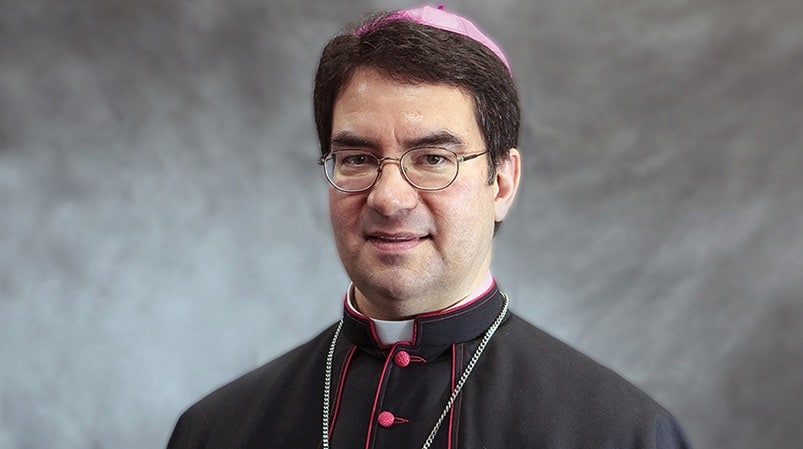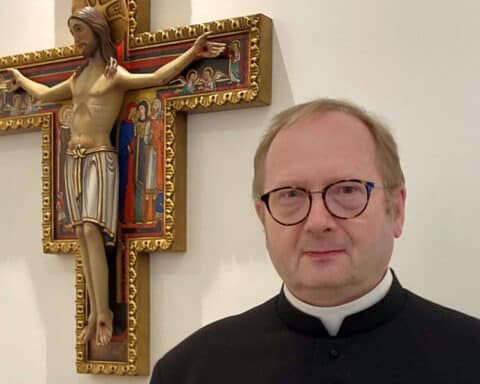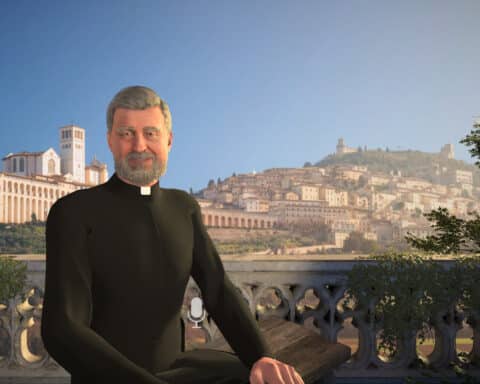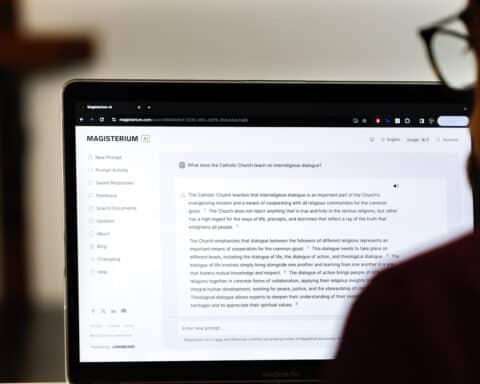At the beginning of June, Google announced that it had declined to renew a contract with a Pentagon drone program, which lapses next March. The contract allowed the Department of Defense to use Google’s artificial intelligence tools to study unmanned aerial drone footage. Per the Los Angeles Times, the move came after thousands of employees of the internet company protested what they saw as getting involved in “the business of war.”
On July 11, Pope Francis appointed Bishop Oscar Cantú, bishop of the Diocese of Las Cruces, New Mexico since 2013, as the coadjutor bishop of the Diocese of San Jose, California. On the significance of the appointment, Rocco Palmo, author of the website Whispers in the Loggia, said, “it can be argued that no place has a greater impact on modern American life than Santa Clara County, California,” given that it houses not only Google, but Apple and Facebook as well. And Bishop Cantú, 51, is both young and a tech adopter.
A priest of Galveston-Houston ordained in 1993, Bishop Cantú was named a bishop at 41, an auxiliary of San Antonio, and in his time as a bishop has chaired the U.S. bishops’ Committee on International Justice and Peace (2014-17), a committee whose portfolio includes U.S. foreign policy, the Middle East and moral dimensions of war-making, from nuclear weapons to, more recently, drone strikes.
Bishop Cantú’s move to San Jose occurs in a year that’s seen social media companies face criticism over their handling of users’ data, a story that has been dwarfed by scrutiny of the Church’s handling of sexual abuse.
San Jose’s current head, Bishop Patrick J. McGrath, is 73 and has led the diocese since 1999. The Diocese of San Jose has 620,000 Catholics, as opposed to the 234,000 of the Diocese of Las Cruces. A coadjutor is an auxiliary bishop with a right of succession to the bishop of a diocese. San Jose welcomed Bishop Cantú in a Mass on Sept. 28. Before making the move from New Mexico to California, he spoke to Our Sunday Visitor. The following is an excerpt of that conversation:
Our Sunday Visitor: You’re moving to your fourth diocese. What stands out for you as you contemplate this transition?
Bishop Oscar Cantú: I’ve come from large dioceses, in Houston where I grew up and where I was a priest for 14 years, and San Antonio. … So I’m somewhat familiar with the larger structures and some of the challenges. And … the multicultural reality of San Jose is reminiscent of Houston, which is tremendously multicultural. … I’ve never lived in California, so that will be new to me. Certainly my time here in Las Cruces … the attention that I had to pay in this diocese was at a very different level than what my attention is going to be drawn to in San Jose. Here it was more to the individual plight of poverty, of the issue of the economy, of immigration. … Certainly I will have to shift gears, and maybe even vehicles, going to San Jose.
OSV: You mentioned immigration. What has been your pastoral approach to that issue?
Bishop Cantú: I’ve done what I’ve been able to do, and that is at the regional level and the local level, to have conversations with the heads of ICE, the head of Customs and Border Patrol, and both Bishop Seitz from El Paso and I have met with them several times to express our concerns, to build some communication and some relationships … so we can … encourage them to be as humane as possible and as transparent as possible, and to express concerns when they arise. …
When the executive orders came out early last year, I had to change my entire agenda for months, because our communities were utterly frightened. … So I organized a series of visits to our immigrant-heavy communities, to pray with them — I invited them to a time of adoration, … we listened to some of the teachings of the Church, the magisterium on the issue of immigration, and then to preach and to assure them that the Church is here to accompany them and that the Church will always walk with them wherever they may be.
So I think they found solace in that reassurance. … We partnered with local agencies to offer these communities “know your rights” sessions. … It’s been heartwarming to see how our community has come together.
OSV: As your new diocese houses tech giants, what’s your sense of these platforms that we’ve migrated our lives onto?
Bishop Cantú: I think a company like Facebook — as well as a Catholic bishop — has learned that we must tread carefully, because it’s a whole new world. And Mr. Zuckerberg, I think, has realized that as they’ve made some significant adjustments to their policies and so on.
I think it’s here to stay, whether it’s these exact companies or platforms. But social media is here to stay, and it’s the new meeting place of cultures and of peoples. I think that the Church needs to be there, that we have to have a presence there — one in humility, but also in truth and in beauty, of what the Gospel offers to the world. …
We need to learn how to use this technology, how to use it responsibly. … There’s no drawing back from it. St. Paul didn’t shy away from having conversations with the Greeks and with the pagans. And that’s exactly [what is needed now], an exchange of ideas, to offer the beauty and the truth of the Gospel in the midst of this exchange of ideas.
OSV: In June, Google declined to renew a defense contract relating to the use of artificial intelligence technology in drones. This intersects with your experience on the bishops’ Committee on International Justice and Peace. Could you see dialogue along those lines?
Bishop Cantú: Absolutely. It’s … the tradition of the Church — that there is a tremendous wisdom, particularly with justice and peace, with human dignity, to offer in the public square. And so the just war theory has been adopted, essentially, by the military in the United States, because they see the wisdom there, that it makes sense. It makes sense strategically, militarily, and it makes sense morally.
And so I think … we need to offer the tradition and wisdom that the Church has with regard to making moral decisions — that we can’t hide behind the fact that it’s a public company, that they’re going to be amoral. They are human beings, and they are serving human persons. And they’re serving human communities, and there are implications that come from that.
And that’s where we have the expertise. They have the expertise in building and designing platforms in social media and communication. We have the expertise in what it means to be human and what it means to live in a human community. We need to have dialogues in that regard. …
And policies are being developed at diocesan levels, and I think that’s where it needs to start, … from the grassroots upwards, to be able to pool that wisdom and that experience … and allow it to mature, so that it can come together for some ethical guidance in that regard.
OSV: With so many young people dissociating themselves from religion, what’s your sense of how the Church can better reach them, whether across social media or otherwise?
Bishop Cantú: That [dissociation] speaks not just to kids, to young people; it speaks to what’s happening with parents … — that society itself, families themselves are drifting away or, perhaps little by little, have dissociated themselves from the Church.
What do we need to do differently? What do we need to do more effectively to engage these families, to engage young parents and to engage young people in the Faith? … That’s where I think we need to turn to our young adults as the resident experts, so to speak, to allow them to be the protagonists. …
They see what touches the hearts and lives of their peers, particularly those who have left the Church. And that needs to be a dialogue.
OSV: What should Catholics expect from their bishops on the issue of abuse?
Bishop Cantú: I see this as a terrible self-inflicted wound that is now a gaping wound. It must be thoroughly cleansed and disinfected before being bandaged. This will bring pain, humiliation and embarrassment. But there is no other way to do this. We must own up to our sins and crimes.
The USCCB is in dialogue with Pope Francis regarding the accountability of bishops, which is critical at this moment. Four values are guiding our decisions, policies and words at this juncture: transparency, accountability, truth and humility. This is our pathway forward, and it will be a long road to recovery.





